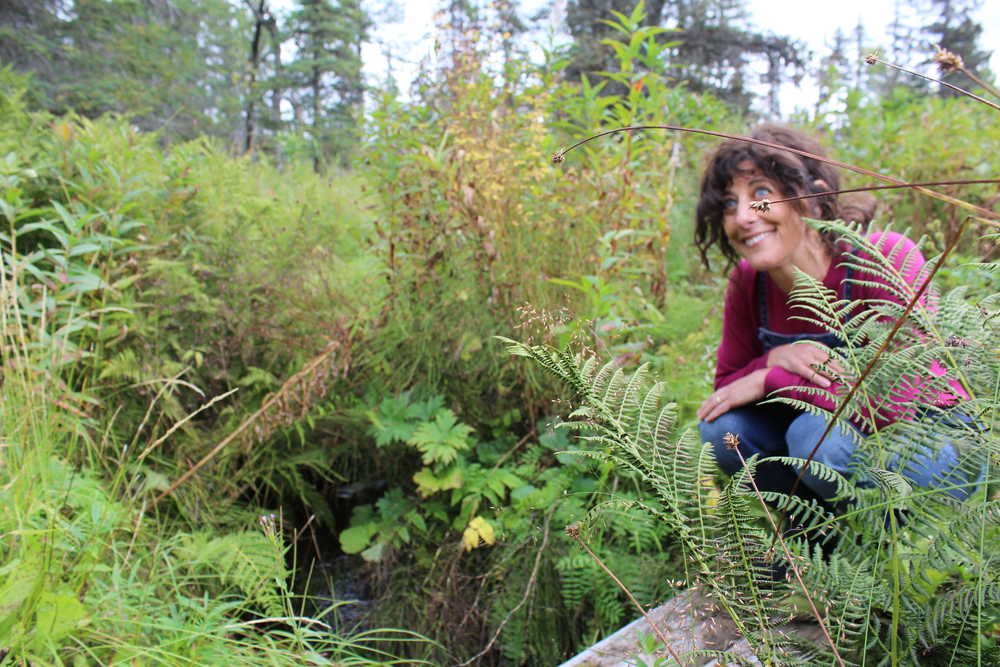When working with nature, doing nothing often means a great deal.
Such is the case of Paul and Jen Castellani, the owners of Will Grow Farm, and their home located off the beaten path between Homer and Anchor Point. Despite the Castellani’s efforts to leave the land on which they live and reap the produce of their labor unspoiled, they were stunned by the recognition when they heard they would be the second recipients of the Kachemak Heritage Land Trust’s new King Maker award.
“Mostly what we did was we stayed back from it (the stream). We could have cleared the slope down to it, it’s south facing and moist and rich, but we wanted a barrier and we knew that was important,” Paul said. “That’s basically all we did. We respected it.”
When they moved onto their land in the spring of 1994, they were aware of the stream that run through their property partially above, partially below ground. They had an inkling fish such as baby salmon might live in the stream, so they left it untouched.
The Castellanis built a house and a garden, which expanded into the farm they sell vegetables from at the Homer Farmers Market, but kept their distance from the stream.
In their early days of living on the land, Jen and Paul recall hauling drinking water from the stream, but now they source their water from a well.
“We knew there were salmon in there and it was also our water source that we drank so we knew it was important for that reason,” Paul said. “We have water rights on it (the stream) so we could draw at least 500 gallons a day from it but it hasn’t been necessary.”
Their treatment of the stream was not the exception to their philosophy as they developed their land, but rather the rule. When cutting down trees to clear the way for their gardens, they used canola oil instead of motor oil to power the chainsaws so as not to contaminate the ground they dreamed of farming on, Jen said.
“The 140 acres in your care are being protected by the exception way you are managing your landscape,” said a letter from Kachemak Heritage Land Trust excutive director Marie McCarty and communications and development director Denise Jantz. “It’s actions such as your organic farming practices, off the grid lifestyle, low impact on the environment, and intentional decision making in respect to wildlife and the waters that surround you, that are good for the baby salmon that inhabit the lands in your care.”
When Kachemak Bay Research Reserve contacted the Castellanis about placing antennas on their property in order to determine if baby salmon were indeed swimming through their stream, the answer was an unhesitant yes, Paul said. Their eagerness and interest in the research being done on their land stood out to Coowe Walker, KBRR watershed specialist, who was used to getting much more negative, unenthusiastic responses to requests to place equipment on private property.
“We’d see them working on it a little bit and then Coowe would give us a discovery that confirmed our, because we used to walk all over the property before the beetle kill and you could just go anywhere and see what was going on, suspicions that it goes underground a lot,” Jen said.
The Castellani’s received their award from KHLT at their home last week as they were unable to attend the officially planned crowning event at the Slidehole Campground in Anchor Point during a community BBQ on Saturday, Aug. 27 from 12 – 3 p.m. KHLT will still make a presentation about the King Maker program at the event at about 12:30 p.m.
The King Maker award is new to KHLT, but not to Alaska. The program was started by Great Land Trust, which partners with organizations throughout Southcentral Alaska with a focus on the Municipality of Anchorage, Mat-Su Borough, Prince William Sound and Kodiak, according to the Great Land Trust website.
At the recommendation of GLT, KHLT has started it’s own initiative to honor people on the Peninsula who make salmon safer. Individuals crowned King Makers are good models for the community whose actions make sure salmon return, making more fish for our future, according to KHLT. The hope is to eventually spread the King Maker program to other land trusts in the state, Jantz said.
The first award was given to Dan Pascucci at an event on Aug. 5 celebrating his work in conservation education to both children and adults through Center for Alaskan Coastal Studies as a teacher/naturalist and as the education specialist at the Kenai Watershed Forum.
The motto of the King Maker program, “little actions make big fish,” pairs well with KHLT’s “Baby Salmon Live Here” campaign, which they hope to launch in September, Jantz said. Signs on properties identified as significant to baby salmon will be installed in order to show Alaskans that even little streams or offshoots of rivers that might be deemed unimportant – like the one on the Castellani’s property – can be a part of the delicate salmon ecosystem many hope to protect.



